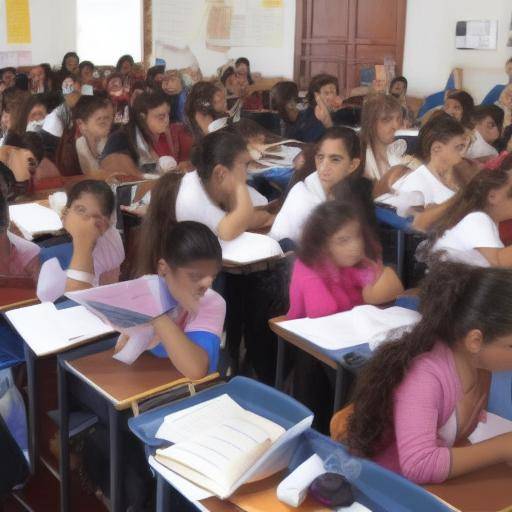
Financial education is a crucial element in the formation of intelligent consumers. Through knowledge of personal finances, the ability to make informed decisions and control of money management, individuals can improve their economic well-being and carry out more conscious and responsible consumption. In this article, we will explore in detail the impact of financial education on smart consumption, analyzing its importance, benefits, challenges and current trends.
Introduction
Financial education refers to the set of knowledge and skills that enable people to manage their economic resources effectively. This type of training is essential for the development of informed citizenship and the promotion of responsible consumption, capable of making appropriate financial decisions on a daily basis.
In the course of this article, key aspects related to financial education, such as its history and evolution, the impact on consumer decisions, and strategies to exercise more effective control over personal finances will be addressed.
History and Background
Financial education has its roots in the need to equip people with the necessary tools to understand and manage money effectively. Throughout history, the evolution of financial education has been instrumental in addressing the challenges posed by economic changes and innovations in the financial sphere. Since the creation of the first financial systems until the arrival of the digital era, financial education has played a key role in training individuals and communities to make responsible decisions regarding their heritage.
Financial training has evolved significantly over time, influenced by several major milestones, such as the Great Depression, which highlighted the importance of understanding financial risks, and globalization, which expanded the scope of financial transactions and the need for increased economic literacy. Financial education has been adapted to new realities and challenges, incorporating concepts of investment, savings, responsible indebtedness and financial planning.
Deep analysis
The benefits of sound financial education are varied and transcendental. Individuals trained in this area are more likely to make informed financial decisions and can therefore avoid falling into economic traps, such as over-indebtedness or lack of savings for the future. In addition, financial education can contribute to greater economic stability at the macro level by reducing morosity rates and improving the financial health of communities. However, despite these benefits, financial education also faces challenges and obstacles, such as inaccessibility or lack of focus in certain communities.
Currently, financial education faces new challenges, such as the influence of technology and social networks on consumer decisions, the rise of cryptocurrencies and the need for greater understanding of financial risks. To counter these challenges, innovative strategies have been developed that combine traditional financial education with digital tools and more dynamic approaches.
Comprehensive review
The conjunction of knowledge, decisions and control in the area of financial education is crucial for the development of informed and responsible consumers. The acquisition of financial knowledge, the ability to make sound decisions in the consumption and effective management of economic resources represent fundamental pillars for a balanced and sustainable financial life.
Best practices in financial education need to be thoroughly analysed, with examples of successful programmes, innovative education strategies and inclusive approaches that reach the entire population, regardless of their socio-economic or cultural level.
Comparative analysis
The relationship between knowledge, decisions and control in the field of financial education is crucial for effective financial management. Knowledge provides the basis on which financial decisions are made, allowing for the assessment of available options. Knowing the basic concepts of savings, investment, budget and indebtedness is essential for making informed financial decisions. On the other hand, financial control implies the ability to manage and maintain a healthy balance between income and expenditure, avoiding excessive oversight and indebtedness.
It should be noted that the financial decision-making process is closely linked to the level of financial education of each individual. Those with greater financial knowledge often make more informed decisions, as they understand the risks and benefits of each option. On the other hand, the degree of control over personal finances is related to the ability to implement effective financial decisions in daily life, avoiding excessive consumer impulses and managing economic resources responsibly.
Practical Tips and Accessible Advice
To improve financial education and promote smart consumption, it is essential to provide practical resources and tools. Some practical tips include:
- Develop a realistic monthly budget that includes fixed expenses, savings and a percentage for leisure.
- Avoid excessive indebtedness, prioritizing the payment of debts and seeking favourable interest rates in case of requiring funding.
- Increase financial knowledge through reading books, attendance at seminars or specialized courses, and follow-up to reliable sources of financial information.
- Find professional advice on investment and financial planning, to optimize the management of monetary resources.
- Promote the culture of long-term savings and investment, promoting retirement planning and forecasting for future expenses.
These practical advices can contribute significantly to the development of a more conscious and responsible approach to personal finance.
Industry Information and Expert Reviews
Financial education and its impact on smart consumption have attracted the attention of many financial experts. Industry professionals, academics and financial advisers have expressed their views on the importance of financial education and its implications for consumer behaviour.
According to various experts, financial education is a key tool for empowering consumers and reducing financial vulnerability. In addition, the integration of financial education into public policies and educational programmes is vital to fostering a more informed and resilient society in the face of economic challenges.
Case Studies and Practical Applications
Analysis of case studies that illustrate the effective implementation of financial education in different contexts can provide clarity on the tangible benefits of this approach. The implementation of financial education programmes in schools, community organizations and workplaces has demonstrated positive impacts on money management, financial decision-making and long-term planning.
In addition, financial education strategies can be explored in specific sectors, such as debt management in young entrepreneurs, retirement planning in older adults, or responsible investment in the business sector. These practical cases specifically illustrate how financial education can influence smart consumption and foster greater financial stability.
Future Trends and Predictions
The future outlook of financial education and its impact on smart consumption is subject to various trends and predictions. With the advancement of technology, a greater influence of digital tools and online education platforms is expected in the diffusion of financial knowledge. In addition, the growth of personalized financial education and tailored to the specific needs of each individual is a growing trend, as the diversity of financial profiles is recognized and the importance of providing tailored solutions to each case.
Predictions suggest that financial education will be integrated more deeply into educational systems, from school to university, allowing financial skills to develop early and continue to evolve throughout life. The impetus for public policies aimed at financial inclusion and the promotion of responsible consumption is also seen as a way forward.
Conclusions
Financial education plays a central role in the formation of conscious and responsible consumers. Its impact on knowledge, decisions and financial control is undeniable, contributing to individual and collective economic well-being. As society moves towards greater digitalization and financial complexity, training in financial education becomes essential to confront the challenges and take advantage of the opportunities of the current economic environment.
The conjunction of knowledge, decisions and control in the area of financial education is essential for the construction of a solid foundation that will enable the management of financial challenges in an informed and responsible manner. The acquisition of financial skills is a path to intelligent consumption and effective management of economic resources, promoting a life with less financial stress and greater well-being.
Frequently asked questions (FAQs)
Why is financial education important to make smart consumption decisions?
Financial education provides the tools and knowledge needed to evaluate consumption options, understand financial risks and benefits, and make informed decisions that ensure responsible management of money.
At what stage of life is it crucial to receive financial education?
Financial education is relevant at all stages of life. From childhood to age, personal finance training allows you to develop skills that are fundamental to financial decision-making over time.
How can financial education impact personal finance control?
Financial education provides the basis for more effective management of personal finance, allowing budgeting, debt management, savings planning and informed financial decisions.
What are the effective strategies for teaching financial education?
Effective strategies for teaching financial education include the contextualization of knowledge, the use of practical examples, the active participation of students and the integration of technological tools.
What is the long-term impact of sound financial education?
Strong financial education can have a significant impact throughout life, contributing to greater financial stability, more informed decision-making in consumption, and effective planning for the future.
What is the role of financial education in preventing over-indebtedness?
Financial education provides the necessary tools for understanding financial risks, assessing debt capacity in a responsible manner and avoiding over-indebtedness.
Conclusion
In short, financial education plays a crucial role in the development of conscious and responsible consumers, contributing to more informed consumer decision-making, more effective management of economic resources and ultimately greater financial well-being. The impact of financial education on knowledge acquisition, informed decision-making and financial control is undeniable, transforming people's relationship with money and promoting smart and sustainable consumption.






















































